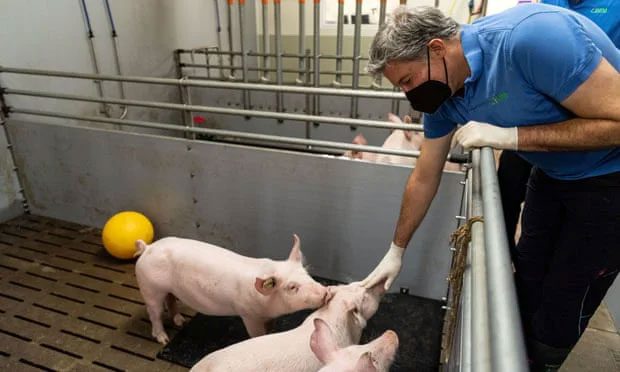The plan of the German scientist is based on the world’s first genetically modified pig heart transplant for humans in the United States last month, but with a simpler version.
German scientists are planning to breed and multiply genetically modified pigs to donate hearts for humans, with a simpler version based on the case of genetically modified animals in the U.S. last month during the world’s first pig heart transplant for a human, according to the Guardian.
Eckhard Wolf, a scientist at Ludwig Maximilians University (LMU) in Munich, stated that his team aims to create a new species, modified from Auckland Island pigs, to be ready for transplant trials by 2025.
In the first surgery of its kind, a research team at the University of Maryland, USA, last month transplanted a pig heart with 10 genetic modifications into a man with a terminal illness.
Doctors reported that the patient is responding well, although risks of infection, organ rejection, or hypertension remain.
“Our intention is to conduct a simpler model, specifically with 5 genetic modifications,” Wolf said.
This scientist’s plan has sparked significant controversy in a country with one of the lowest organ donation rates in Europe, while animal rights movements are gaining momentum.

Mr. Eckhard Wolf with pigs at the Badersfeld research farm in Oberschleissheim, Germany. (Photo: Reuters).
Wolf has been researching xenotransplantation – the transplantation of animal organs into humans – for 20 years. He mentioned that his team will use rudimentary cloning technology to create an “initial generation”, from which genetically similar future generations will be bred.
This first generation is expected to be born this year, and their hearts will be tested on baboons before the research team seeks approval for clinical trials on humans within two to three years, Wolf added.
The transplants will be performed for patients with organ failure who have no other treatment options. As of the end of 2021, there were about 8,500 patients on such waiting lists in Germany, according to data from the country’s Organ Transplantation Organization.
Supporters of Wolf argue that his plan could help shorten that waiting list, but opponents claim that this method violates animal rights, turning pigs into “organ factories” while the monkeys used in transplant experiments must die in pain.
In February 2019, a petition from the German Doctors Against Animal Experiments group calling for a ban on xenotransplantation research collected over 57,000 signatures.
Kristina Berchtold, a spokesperson from the Munich branch of the German Animal Welfare Association, described this approach as “very ethically questionable.”
She stated: “Animals should not be used as spare parts for humans. Pets, farm animals, and both bred and naturally born animals have the same needs, fears, and rights.”



















































